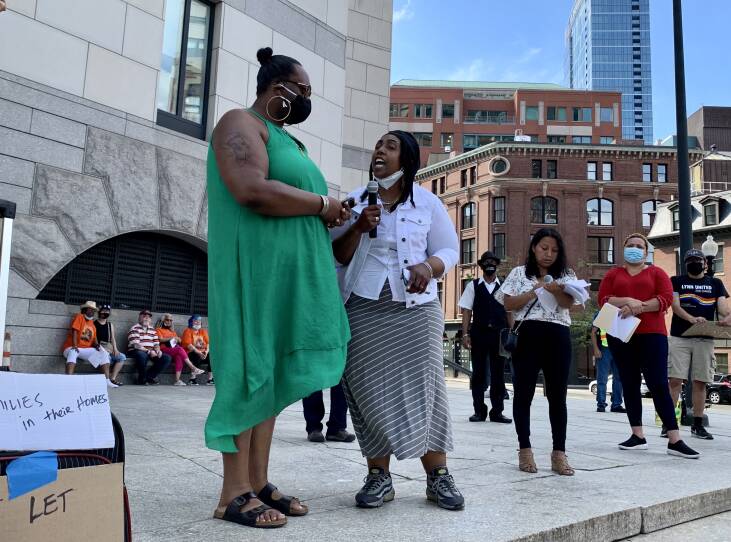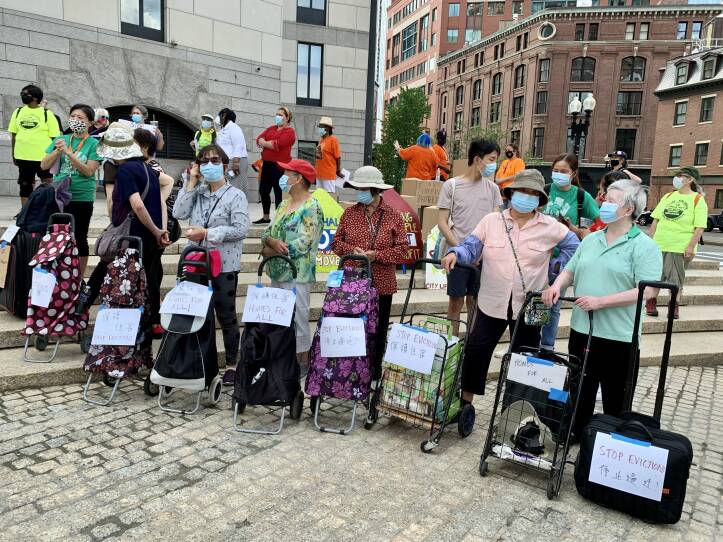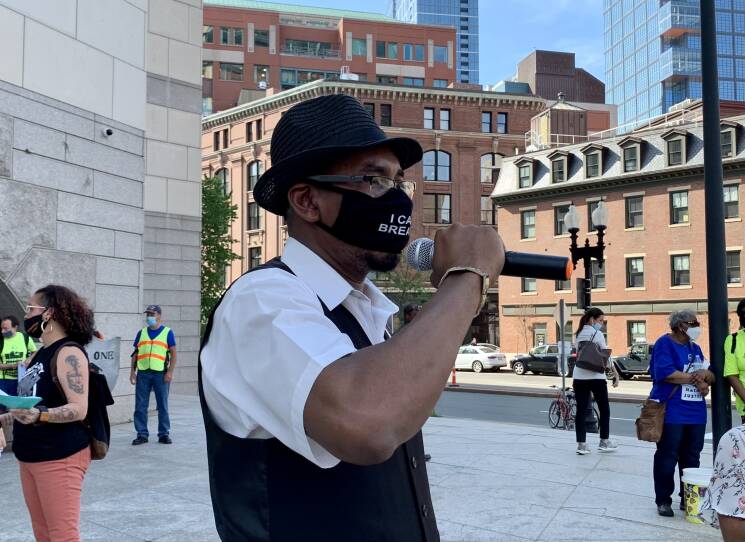When the pandemic first hit, Dezyre Lewis found herself unemployed and unable to pay the rent for her Dorchester apartment.
“It's just been a really uncomfortable situation,” Lewis said. “If I'm not making any money to pay my landlord, my landlord isn't making any money to pay her mortgage.”
Lewis applied for rental assistance through Residential Assistance for Families in Transition, or RAFT, a state-run homelessness prevention program that can provide up to $10,000 to eligible applicants. Lewis applied twice and was rejected both times. She’s not alone: More than 50% of the 36,485 applications processed in the last year were not accepted by the state, according to data from the Massachusetts Landlords Association.
“On the back page of the RAFT application it says, ‘Please do not call, you will hear from us within several weeks,’” Lewis said. “What is several weeks? That could mean two weeks to you, three months to me. I’m left in limbo, and it’s not fair to my landlord. Homelessness is something serious.”
Despite protections put in place to prevent evictions during the pandemic, thousands of Massachusetts residents are already finding themselves forced out of their homes, with federal eviction moratorium set to expire at the end of June. The Centers for Disease Control and Prevention imposed the pause in ousting tenants.
Since Massachusetts' own eviction moratorium expired last October, landlords have filed about 17,000 evictions and nearly 2,500 have been executed, according to housing court data. That’s slightly more evictions filed than during the same time period in 2019, when there was no moratorium.
Last March, President Joe Biden signed the American Rescue Plan, which provides about $900 million in federal funds for rent relief for Massachusetts tenants. But thousands of tenants are still waiting for those funds, according to Doug Quattrochi of the Massachusetts Landlords Association.

“This money needs to go out very quickly,” Quattrochi said. “There are going to be folks who are impacted for a long time yet to come, but there are folks who are in court now.”
Quattrochi says the state needs to address delays and mounting uncertainty around the distribution of the funds.
“It's really hard to get this rental assistance, the application is long, and people aren't doing it correctly,” he said. “So a lot of folks are getting rejected.”
Metro Housing, which administers RAFT funds to the Boston area, has distributed more than $50 million to renters this year, according to the nonprofit. Chris Norris, the nonprofit's executive director, says that when applications are closed it's usually because tenants didn't provide the information requested within a two-week timeframe.
“There’s frustration on the other side as well,” Norris said. “You have frustration from homeowners who try to reach out and don't get responses. You have frustration from those of us who are administering the program who want to serve as many eligible people as possible as quickly as possible with as much money as possible. But the first step starts with filing a complete application.”
Norris says there were “growing pains” at the beginning of the process in October and November, when Metro Housing was working with a small staff of 11 people, averaging a processing time of 12 weeks. The nonprofit now has 75 employees and has reduced processing time to four weeks — but after 14 days, if the applicants don’t respond with the necessary information, their applications are closed.
“Every time we have to close an application, it's frustrating for us because we know whoever started that application probably is still in need,” Norris said. “But after three, four or five or more times of trying to reach out to someone if they're not responsive, we have to reach out to the next person in line.”
In October, Gov. Charlie Baker announced $100 million in emergency funds for RAFT. But Baker did not extend the moratorium on evictions after a federal judge threatened to overturn it.
“The bigger issue was the longer the moratorium stayed in place, the deeper the hole becomes that everybody would have to fight a way out of,” Baker told reporters at a news conference at the time. “The uncertainty and the difficulty of continuing to let that problem fester from our point of view was the wrong move at this time.”

Housing advocates like Helen Matthews of City Life/Vida Urbana argue that nearly all evictions shouldn’t happen at all during a state of emergency that threatens the health and safety of tenants.
“If you just have a moratorium and no rent relief or if you just have rent relief and no moratorium, people will inevitably get evicted,” Matthews said. “We need to fill in the cracks of those protections so that nobody gets evicted for a non-emergency reason.”
The state legislature voted Tuesday to extend and reinstate provisions requiring landlords to give tenants a notice to quit for nonpayment of rent and protecting renters from eviction while their rental relief applications are being processed.
These protections don’t address verbal eviction warnings or help tenants who might never make it to housing court, according to attorney Joey Michalakes with Greater Boston Legal Services. Michalakes says many tenants aren’t made aware of available resources and legal protections.
“A lot of tenants don't know their rights. A lot of folks, even before the pandemic, get a notice to quit, get scared and move out,” he said. “The most common thing that I see in my practice are undocumented folks who don't want to interact with the legal system and in any way, really."
Depending solely on the federal eviction moratorium, which has been extended repeatedly and challenged by federal judges around the country, could have a devastating impact on local tenants, Michalakes said.
“The CDC moratorium doesn't address the more foundational background questions of, you know, what happens to the money that's owed, and are we going to figure out a way to avoid a person protected by the moratorium from being evicted immediately after it expires?” Michalakes said. “It doesn’t address those questions for the thousands of people who fell behind and haven’t done anything wrong.”

Housing advocates like Michalakes have championed a housing equity bill that would prevent non-emergency evictions and foreclosures during the recovery period after the pandemic. The bill is currently before a legislative committee.
“The bill would make all these resources work together,” Michalakes said, “so that a wave of housing instability doesn't complicate the end of the pandemic and more importantly, the economic recovery from the pandemic.”
The pandemic has also caused a spike in “no-cause” or “no-fault” evictions of tenants who haven't violated their leases. From January through May of 2020, nearly 600 no-fault evictions were filed. That number doubled during the same time period this year, according to housing court data.
Jean Gaspar, 52, said he has paid rent on time at his Dorchester apartment for 13 years, but his new landlord wants him out.
“It’s not the right time to leave the apartment, because of COVID,” Gaspar said. “You might go to a new place, that place isn’t good for you, you might get sick or catch COVID. Anything can happen.”
Evictions are not only a health issue, but also an issue of race and equity: A 2020 report from MIT showed that more than 70% of evictions in Boston occur in communities of color, primarily affecting people like Dorchester resident Dezyre Lewis.
“Being a young Black transgender woman, one of the things that I fear every day is that I'm going to have to go back to living the life that I used to live,” Lewis said. “A lot of transgender women engage in survival sex work in order to make it. Because I've been afforded the opportunity to move into this unit and have the landlord that I have, I haven't had to engage in any of that activity.”

Lewis’ landlord, Carolyn Lomax, also lost her job at a salon due to COVID-19 lockdowns. Lomax owns two properties in Dorchester, and though her tenants are struggling to pay rent — contributing to Lomax’s $65,000 mortgage debt — the 56-year-old mother and grandmother says she won’t evict.
“The moratorium protected tenants so that they would be safe doing this pandemic, and so that our community wouldn't spread this deadly virus,” she said. “The problem is, you can't have pre-COVID laws and still follow those same laws during a pandemic. Our world is on fire, and we’re still trying to hurt and harm people that had nothing to do with this pandemic.”
Lomax is trying to avoid defaulting on her bank loans, but her tenants collectively owe her around $56,000 in unpaid rent. She also has a water bill of $20,000. Still, she is determined to make it work, and says her tenants are staying put.
“It's not their fault. It's not my fault either, I didn't cause the pandemic,” Lomax said. “And it’s not that I don't want to pay, I do. But I can't pay what I'm not getting, I can't do it. My heart wants to do it, and if I know what I know, there's not been a time in my life that it hasn't worked out.”
Lewis is less optimistic — she says she’ll continue to apply for rental assistance, and she’s secured a small part-time job. But she’s still struggling to make ends meet.
“Even with this job, it's still not enough to put groceries in the fridge,” Lewis said. “Homeless has always been an issue. Our shelters have been overflowing for years, and now they’re willing to put thousands of people on the streets. We’re all human. We’re just asking for some compassion here. We deserve it.”







